NAM Urges Passage of New MTB Bill

The House should move quickly to pass the Miscellaneous Tariff Bill Reform Act, legislation on which the NAM has led advocacy efforts.
What’s going on: On Tuesday, House Ways and Means Trade Subcommittee Chairman Adrian Smith (R-NE) introduced the Miscellaneous Tariff Bill Reform Act, which seeks to renew the MTB—a manufacturing-critical law that temporarily removes or reduces tariffs on products not available in the U.S.—as soon as possible.
- The NAM, which has long urged Congress to take up the issue, lauded the legislation and called for its swift passage.
- “Historically, the MTB has always had bipartisan support, and we thank House Ways and Means Trade Subcommittee Chairman Adrian Smith for his leadership and efforts to introduce MTB legislation,” said NAM Managing Vice President of Policy Chris Netram in a statement cited by Chairman Smith’s office. “We urge the House to act quickly so that we can get one step closer to getting this critical legislation to President Biden’s desk.”
- The last MTB expired in December 2020.
Why it’s important: In the three-and-a-half years that they have been operating without an MTB, manufacturers and other businesses in the U.S. have paid more than $1.3 million a day to get inputs they cannot find in the U.S., according to an NAM analysis.
- Passing the MTB through 2026, on the other hand, and reauthorizing passage of future MTB cycles will boost U.S. competitiveness.
- Tariff relief under the previous MTB increased U.S. gross domestic product by up to $3.3 billion every year, according to the U.S. International Trade Commission.
NAM: Manufacturers Need a Better Section 301 Exclusion Process
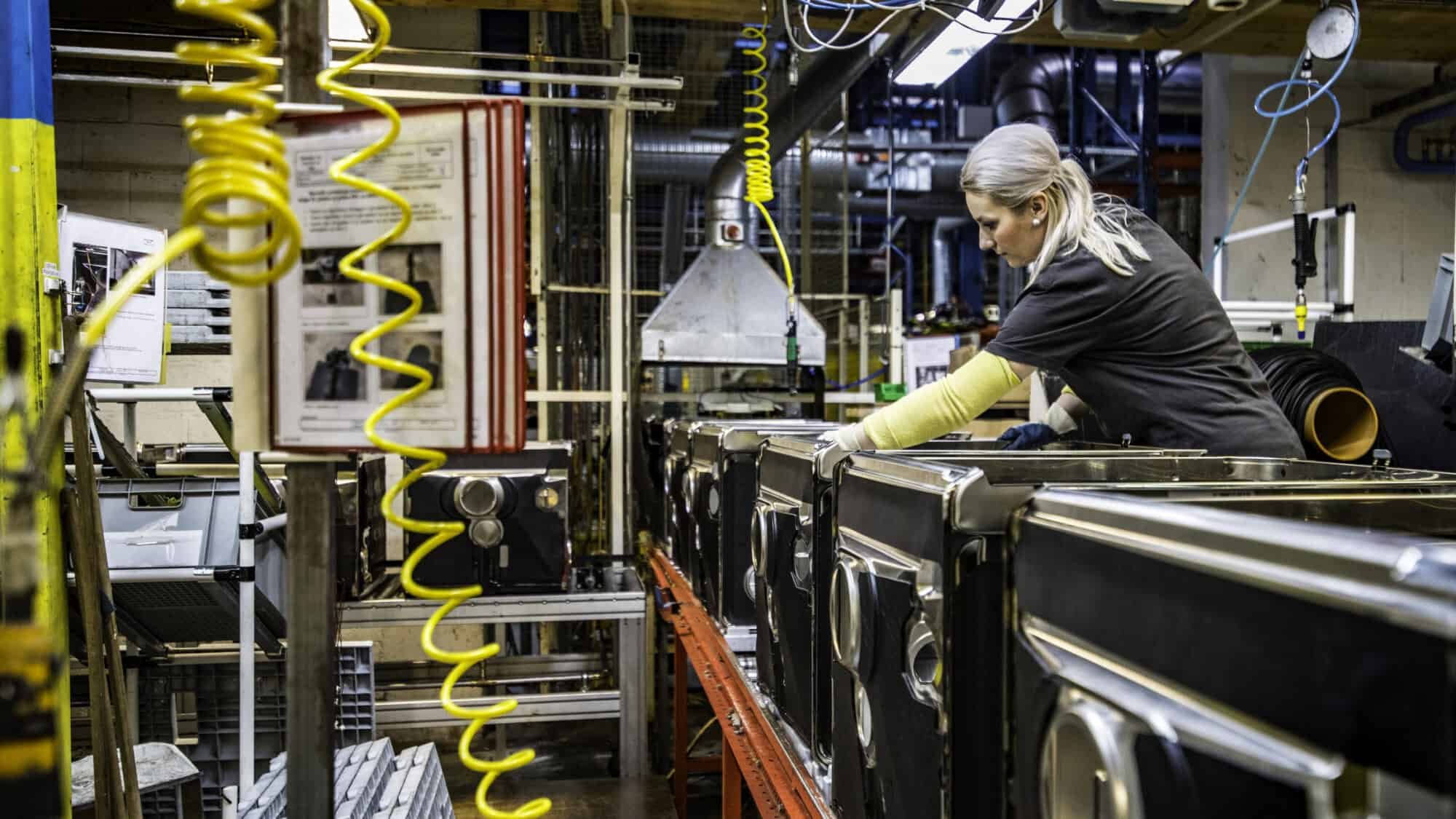
To thrive, create jobs and produce the essential goods the U.S. and our trading partners use every day, the manufacturing sector needs a fair, transparent Section 301 tariff exclusion process, the NAM said Tuesday.
- However, the tariff increases announced this week by the Biden administration could make it much more difficult for manufacturers to produce those critical items.
What’s going on: As part of the U.S. Trade Representative Office’s final Section 301 tariffs review—which the NAM had long urged the office to complete—President Biden said his administration plans to raise “tariffs on Chinese electric vehicles to roughly 100% … increas[e] a key tariff rate on steel and aluminum products to 25% from 7.5%,” raise the solar-cell tariff to 50% from 25% and create a new 25% duty on shipping cranes, according to Reuters (subscription).
- Section 301 of the Trade Act of 1974 authorizes the U.S. to act against foreign trade practices it believes violate agreements. The NAM has been pushing for a finalized report with a fair, transparent Section 301 tariff exclusion process that will both reduce the burden on manufacturers and keep pressure on China to adhere to fair practices.
- The process would allow manufacturers to ask for tariff exclusions for specific products they need.
- “The NAM has long advocated for a full global strategy and a rules-based trading system that benefit manufacturers and workers by opening new markets with our allies,” NAM President and CEO Jay Timmons said.
Why it’s important: Far from freeing the U.S. of “unacceptable risks” stemming from unfair Chinese trade practices, in the absence of a new exclusion process, these tariff increases could limit the ability of manufacturers in the U.S. to obtain needed supplies for goods production.
- This, in turn, could jeopardize U.S. jobs and competitiveness.
- “Manufacturers are concerned about the potential impact this broad swath of tariffs could have on our ability to produce the essential products needed to drive our economy forward, especially if critical inputs become less available and more costly,” said Timmons.
The background: The USTR is legally required to review Section 301 tariffs four years after they are initiated. This most recent review—started in May 2022—is overdue.
- The exclusion process the NAM has long requested allows manufacturers to ask for tariff exclusions for specific products they need.
What should be done: “Manufacturers urge the administration to negotiate new trade agreements with allies and partners around the world and create a new, comprehensive and transparent 301 exclusion process to ensure that manufacturing in America is not being disadvantaged by our own government,” Timmons concluded.
NAM, Allies: Allow Cross-Border Trade

Manufacturers and other businesses on both sides of the U.S.–Mexico border are feeling the pinch from sudden, intermittent port closures and other government measures being taken to mitigate the ongoing migrant crisis, the NAM and two allied groups told President Biden and Mexican President Andrés Manuel López Obrador this week.
What’s going on: Last December, U.S. Customs and Border Protection temporarily shuttered critical rail ports, including San Diego, California, and El Paso and Eagle Pass, Texas, in an effort to stem migration surges, idling nearly 10,000 rail cars on both sides of the border.
- Last month, the Texas Department of Public Safety renewed safety inspections of vehicles between Texas and Mexico, adding hours to cargo trucks’ border wait times (Freight Waves).
Why it’s important: Port closures and increased vehicle inspections “have significantly increased congestion around ports of entry, caused delays to cross-border trade and harmed productive businesses across industries and their employees,” said NAM President and CEO Jay Timmons, Texas Association of Business President and CEO Glenn Hamer and CONCAMIN President Alejandro Malagón.
- The stoppages “risk making critical supply chains between the United States and Mexico less resilient and dependable.”
What should be done: The U.S. and Mexican governments must commit to creating and abiding by predictable, transparent processes for cross-border trade, the groups urged.
- In addition to stopping the port closures for commercial freight and trucking, “our two countries should strive to enhance trading ties as the importance of nearshoring and friendshoring accelerates. Doing so will make our manufacturing, energy and agricultural sectors more competitive globally.”
A Key Trading Partner: The NAM Hosts Make UK, Parliament Members
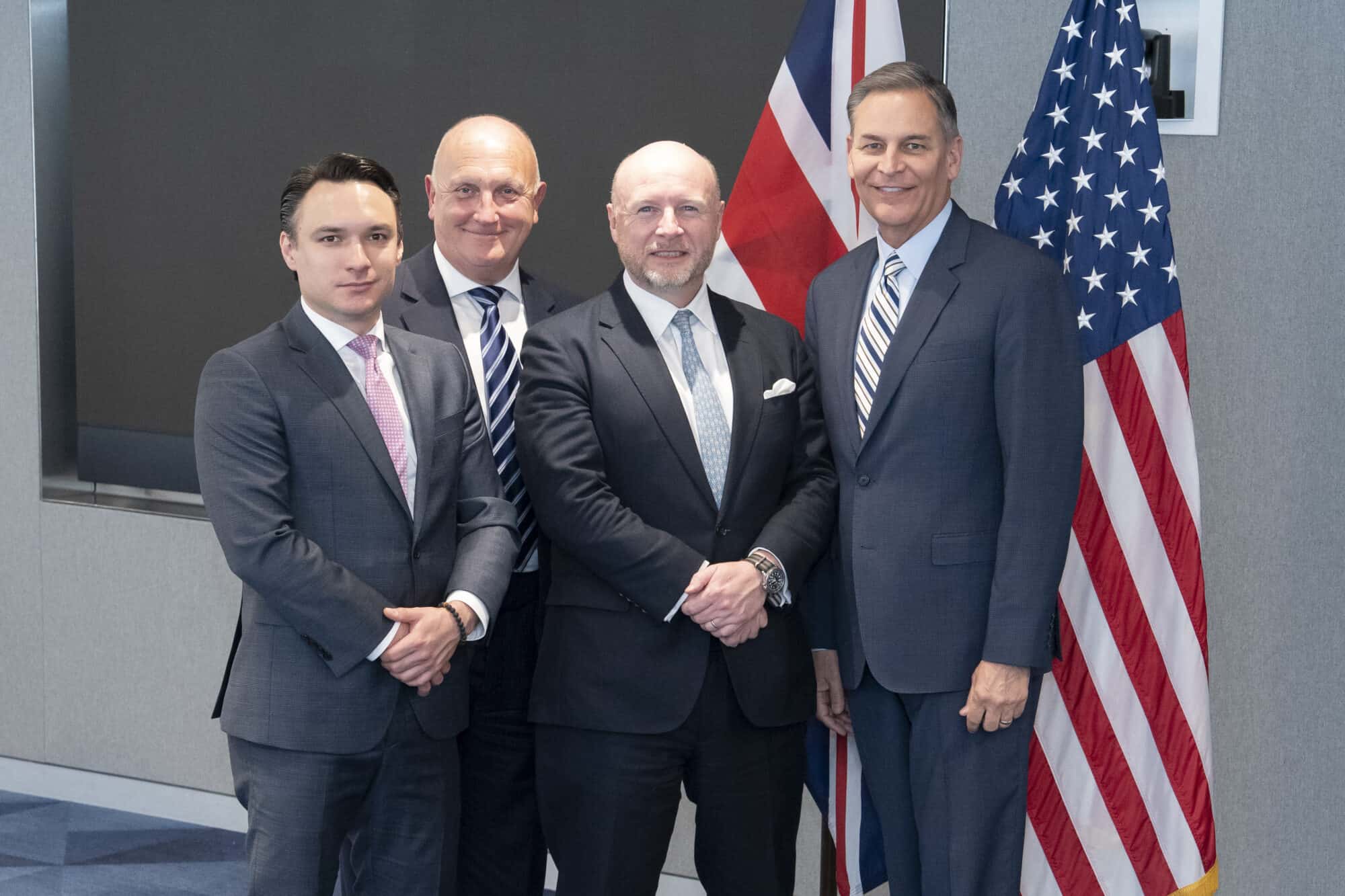
The United Kingdom and United States have many things in common, but perhaps most important is their shared democratic values. These, along with sound trade policies on both sides of the pond, will help propel each respective nation forward.
- That was the main message conveyed during a business roundtable discussion between the NAM and its British counterpart association, Make UK, on Monday.
What went on: In attendance at the meeting at the NAM’s Washington, D.C., headquarters were a delegation of eight members of Parliament who sit on the Business and Trade Commission, British Embassy representatives and nearly two dozen U.S.- and U.K.-based manufacturers.
- The focus of the event—which came approximately a year after the NAM and Make UK signed a memorandum of understanding to collaborate on programming—was to explore ways to enhance the U.S.–U.K. trade and economic relationship. There is no free trade agreement between the U.K. and the U.S.
- The delegation, led by House of Commons Business and Trade Committee Chair Rt. Hon. Liam Byrne of the Labour Party, is also in the U.S. for talks with members of the Biden administration, Congress and the business community to discuss U.K. export growth and manufacturing strategy.
Why it’s important: In the absence of an official FTA between the U.S. and the U.K., the two nations must “be pragmatic about measures our businesses and our governments can take now that will help our economies grow, create jobs, innovate and prosper together,” NAM President and CEO Jay Timmons told the delegation.
- Make UK CEO Stephen Phipson CBE said event attendees all agreed that “as we move closer to our respective domestic elections this year and with the challenges to the framework of global trade continuing, [we must] lean into future bilateral cooperation on trade, innovation, energy and technology, [as well as] defense-sector cooperation.”
Policy talk: Roundtable participants discussed “big-ticket” legislation that has proved particularly important to manufacturers in recent years: the 2021 Bipartisan Infrastructure Law, the CHIPS and Science Act of 2022 and parts of the Inflation Reduction Act of 2022.
- The pro-growth elements in these measures “make our industry more competitive, empowering manufacturers to invest in new facilities and new equipment, expand production and to create jobs,” Timmons went on.
By the numbers: Continued good relations between the U.S. and the U.K. are key not just because of the shared belief in and commitment to democracy, but also because of the large role each nation plays in the other’s economy.
- The U.S. is the U.K.’s single biggest trading partner by country, having accounted for more than 16% of total trade in 2022.
- That same year, U.S. exports to the U.K. were $76.2 billion, an increase of 40% from prior years. Meanwhile, in 2022, American imports from the U.K. were $64.0 billion.
Come what may: Though the U.S. is fast approaching an important and widely anticipated presidential election, the country will stay committed to its relationship with the U.K. no matter who wins in November, Timmons told the delegation.
- “Regardless of the outcomes … we will remain resolved to strengthen our bonds and to do everything in our power to grow manufacturing competitiveness on both sides of the Atlantic.”
House Committee Approves PBM Reforms

The House Ways and Means Committee unanimously passed legislation Wednesday that includes much-needed reforms to pharmacy benefit managers, underregulated middlemen that raise health care costs for manufacturers and manufacturing workers (Fierce Healthcare).
What’s going on: PBM reforms contained in the Preserving Telehealth, Hospital and Ambulance Access Act include increasing transparency into PBMs’ business practices and delinking PBM compensation from medicines’ list prices. These changes will help reduce prices for seniors who rely on Medicare prescription drug plans.
- The NAM has been instrumental in advancing these reforms.
Why it’s important: “When Americans face soaring prices for medicines or treatments, there’s a good chance that is because a PBM has driven up the price,” NAM President and CEO Jay Timmons said Wednesday.
- “These middlemen operate with minimal transparency, and their practices distort the market, increasing the list prices patients pay for medicines while making it more difficult for manufacturers to offer quality, affordable health care benefits.”
What’s next: The legislation approved Wednesday applies to the Medicare market. The NAM is calling on Congress to enact similar changes in the commercial insurance market to lower health care costs for manufacturing employees who participate in employer-sponsored plans.
Novonesis Lets Nature Guide Sustainability Plans
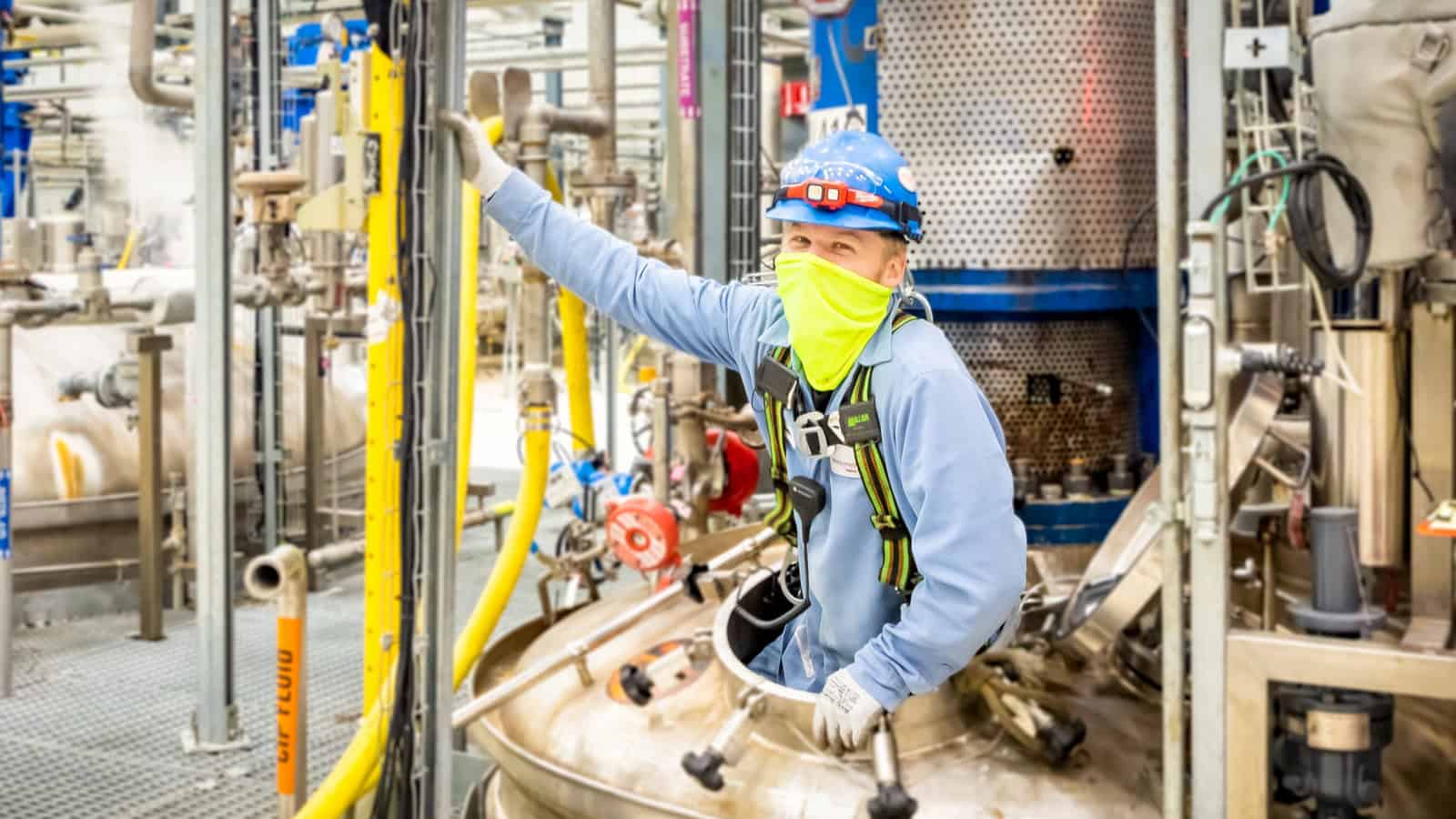
When it comes to good environmental stewardship, Novonesis takes its cue from the natural world itself.
“We are inherently sustainable because we draw from nature,” said Novonesis Senior Vice President of Planetary Health Biosolutions Rene Garza. “As biology matures, we find that nature has evolved to be an efficient utilizer of every single resource out there.”
Back to basics: It’s the perfect model for the newly formed Lyngby, Denmark–headquartered biosolutions firm, the product of a January merger between two Danish legacy companies: enzyme and microbial technology firm Novozymes and bioscience supplier Chr. Hansen.
- The portfolio of Novonesis—which is a combination of the Greek words for “new” and “beginning”—includes enzymes, microbes, novel vitamins and other naturally derived offerings.
- The business has customers across more than 30 industries: food and beverages, animal health and nutrition, energy, fine chemicals, dietary supplements, household care, plastics, plant health and more.
An early adopter: Legacy firm Novozymes set its sights on sustainable business practices more than two decades ago. In 2002, it became the first company in the world to publish a triple bottom-line integrated report.
- “We recognized early on that resources are finite, and the need to do more with less is part of ensuring a better quality of life,” Garza said of the company’s decision to undertake the annual report, a method of stocktaking on sustainability activities using three “bottom lines”: profit, people and planet. “We realized we’re not just here to generate money, but also to create an impact on society and our environment.”
Big goals: That’s why Novonesis has set lofty aims for itself (and is meeting them).
- Firmwide targets include carbon net neutrality by 2050, as well as a 75% reduction in emissions from its own operations and a 35% reduction in emissions from its supply chain by 2030.
- How is it doing all this? Innovation and persistence, according to Garza. “We want to improve our efficiency by as much as we can, and we do this by making improvement to our hardware—pump replacements, reengineering [of] our microorganisms. We also source renewable energy.”
- In fact, Novonesis is on track to source 100% of its energy from renewables by next year. Between 2018 and 2022, it reduced absolute emissions by 63% while increasing revenue.
Water, too: Novonesis knows how important water use is in the overall sustainability picture.
- The company is piloting a reverse-osmosis filtration system at its North America headquarters in Franklinton, North Carolina, that lets it recycle and reuse water. The program, scheduled for full operationality by next year, is going so well there are plans to replicate it at other Novonesis facilities worldwide.
- And at the company headquarters in Denmark, “we have been able to recycle 58 million liters [of water]—the equivalent of 23 Olympic-size swimming pools,” Garza reported.
What government can do: Novonesis and other manufacturers are making great strides in sustainability, but having the right policies in place at the federal level would make it easier for them to do more with less, Garza continued.
- “We need regulatory reform,” he told the NAM. “Federal regulations, if done well, really can drive innovation, particularly in biotechnology. … The government should [also] invest in pilot and demo scale fermentation capacity to allow startups to scale up.”
- The U.S. has the largest concentration of startup companies in the world, he went on, but there is now a “valley of death” between discovery and commercialization of innovations in biology, which federal funding could help remove.
- Finally, manufacturing in the U.S. needs the reinstatement of pro-growth policies from the 2017 Tax Cuts and Jobs Act, including 100% expensing for research and development costs and accelerated depreciation for capital investments.
Stakeholder education: Getting more people aboard the sustainability train is doable—but it will require continued education campaigns.
- “We need long-term thinking [and] to encourage stakeholders to prioritize the long-term over short-term gains,” Garza said. “Sustainability is about balancing immediate and future needs.”
Manufacturers Participate in Small Business Week Capitol Hill Showcase
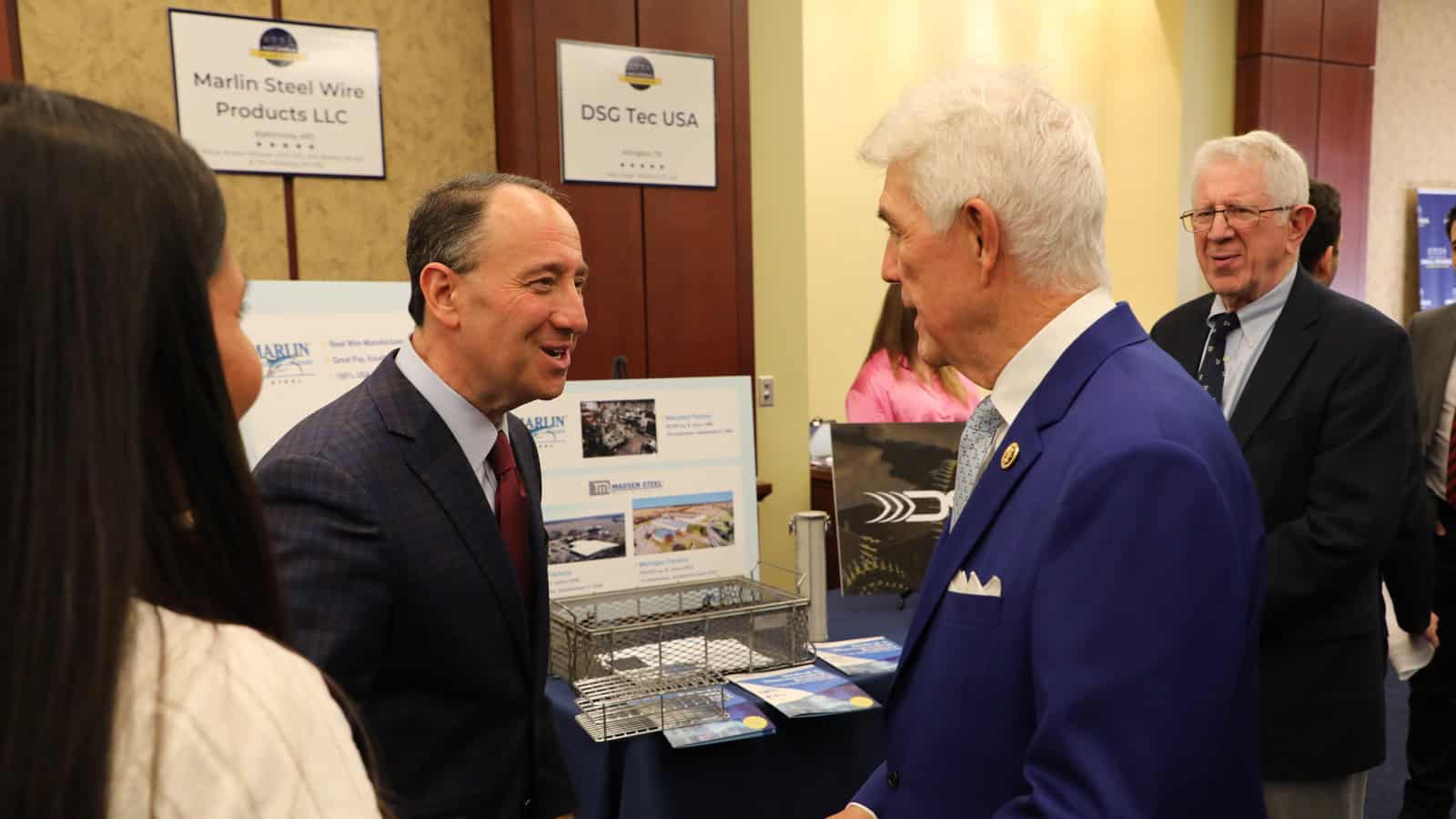
Manufacturers were among the select businesses invited to participate in last Wednesday’s Small Business Week showcase on Capitol Hill, and two in particular—Marlin Steel in Baltimore and its affiliated entity, Madsen Steel Wire Products, in Michigan and Indiana—made use of the time with lawmakers to advocate for some manufacturing-critical priorities.
What’s going on: Republicans on the House Small Business Committee hosted the event to shine a spotlight on the work of job creators throughout the country and draw attention to the federal government’s costly regulatory onslaught (Washington Examiner).
- Marlin Steel and Madsen Steel President and Owner and NAM board member Drew Greenblatt manned a booth with his family at the showcase displaying several products—such as metal baskets and racks—manufactured at his family-owned custom wire and steel products businesses.
- Greenblatt and others invited to the event had the opportunity to meet and speak with House Republican leaders, including Speaker Mike Johnson (R-LA), Majority Whip Tom Emmer (R-MN), Small Business Committee Chairman Roger Williams (R-TX) and Rep. Tim Walberg (R-MI).
The background: Marlin Steel, Madsen Steel and many other manufacturers thrived under a pro-growth tax provision in the Tax Cuts and Jobs Act of 2017 that allowed businesses to deduct 100% of their R&D costs in the year the costs were incurred.
- But in 2022 and 2023, that policy and two others—enhanced interest deductibility and 100% accelerated depreciation—expired.
- Ever since, manufacturers’ tax bills have increased, as companies, including Marlin Steel, have been required to amortize their R&D costs over five years, making innovation-crucial investments much more costly.
- “We want to grow jobs in our Indiana and Michigan factories, but we also need to give our talent the extraordinary tools needed to compete with China,” Greenblatt said. “We need immediate expensing to cover these huge investments. We put in $5 million but now have to pause investment. We need Congress and the president to act to allow us to hire more factory workers faster.”
Why it’s important: The showcase gave Greenblatt an opportunity to hammer home to lawmakers the importance to manufacturing of reinstating the expired tax provisions—and the need to act quickly to ensure that an additional suite of pro-growth tax measures, set to expire at the end of 2025, is extended.
- Another issue top of mind for Greenblatt and manufacturers everywhere is the flurry of regulations being handed down by federal agencies.
- In 2022, the cost of federal regulations to manufacturers was approximately $350 billion, a 35% increase from a decade earlier, according to an NAM study.
- Small manufacturers spend more than $50,000 per employee per year to comply with federal regulations.
Stop the struggle: “As a small business owner myself, I know all too well the many struggles small businesses face when trying to compete in the marketplace,” Chairman Williams said. “It is my hope that this … showcase serve[s] as an opportunity for more to learn about how invaluable Main Street is to our economy and our country.”
Related: Last week, the NAM unveiled videos on social media from other leading small and medium-sized manufacturers, adding their voices to key competitiveness priorities, featuring NAM board members Patricia Miller, CEO and founder of M4 Factory, Charles Sukup, chairman and treasurer, Sukup Manufacturing Co., and Nicole Wolter, president and CEO, HM Manufacturing.
NAM First-of-Its-Kind AI Report Includes Policy Recommendations

Artificial intelligence is improving efficiency, workplace safety, product development, machine maintenance and supply chain logistics at manufacturing facilities everywhere, according to a new, first-of-its-kind report from the NAM.
What’s going on: “Working Smarter: How Manufacturers Are Using Artificial Intelligence,” released today, details use cases for AI in the sector, discussing how manufacturers nationwide are using it to improve lives everywhere.
- The report features deep dives on AI-powered technologies at manufacturers, including Johnson & Johnson, Schneider Electric and Hitachi.
Trailblazers need good policy, too: “From developing more effective clinical trials and improving workplace safety to strengthening supply chain resiliency and supporting workforce training for employees, AI is unlocking new opportunities to strengthen our modern manufacturing workforce and improve the lives of all Americans,” said NAM President and CEO Jay Timmons. “Congress and the Biden administration can support manufacturers’ adoption of AI by enacting strong data privacy protections, investing in workforce training and providing regulatory certainty.”
- Legislators should “lean on” manufacturers’ deep experience when drafting AI-related legislation, added Johnson & Johnson Executive Vice President and Chief Technical Operations & Risk Officer and NAM Board Chair Kathy Wengel.
- “All possible futures for modern manufacturing in the U.S. involve AI,” she said. “Policymakers must develop sensible, carefully thought-out frameworks for various AI applications. … We need a policy environment that supports innovation and growth in manufacturing AI, because it will bolster U.S. competitiveness and leadership in this critical emerging field.”
The recommendations: The report contains immediately implementable policy recommendations for lawmakers:
- Invest in research and development and career technical education institutions to train the modern manufacturing workforce.
- Pass federal privacy legislation to advance individuals’ privacy protections and give legal clarity that will support continued innovation by manufacturers.
- Use a risk-based approach to new AI regulations that tailors any future laws to specific use cases and minimizes the burden of compliance.
- Ensure that AI regulation is aligned globally.
Manufacturing Employment Stays the Same
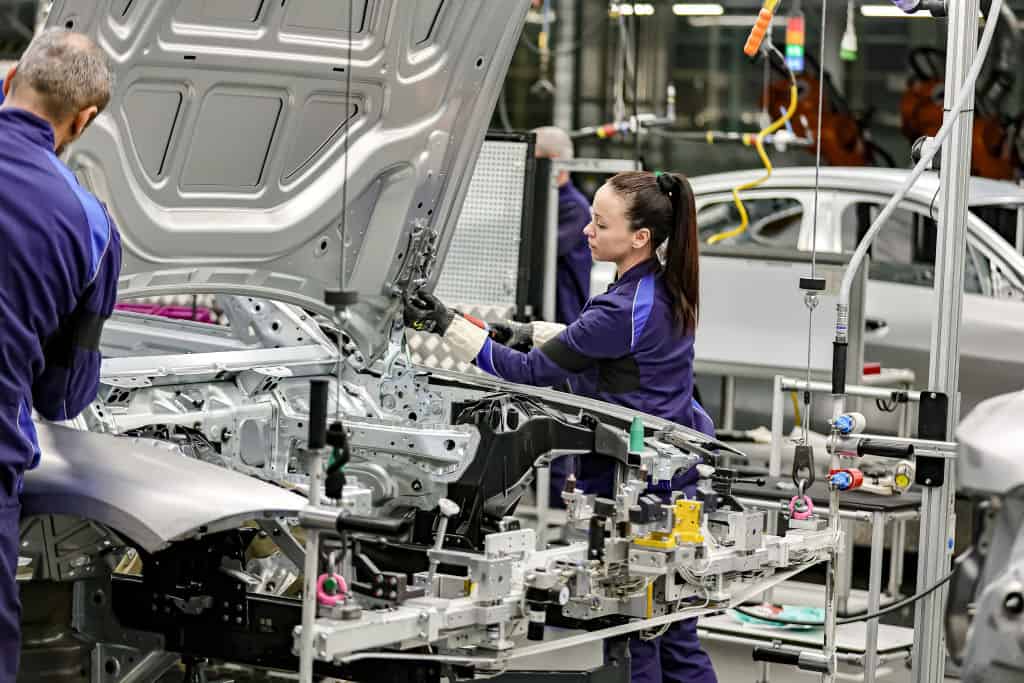
Employment in manufacturing remained essentially the same in April as it was in March, according to data out today from the U.S. Bureau of Labor Statistics.
- Overall employment increased by 175,000.
What’s going on: Manufacturing employed a seasonally adjusted 12,961,000 workers in April, up just marginally from 12,953,000 in March and 12,957,000 in February.
- The number of people employed in manufacturing was also up only slightly from April 2023, when it was a seasonally adjusted 12,941,000.
Durable goods vs. nondurable: There were a seasonally adjusted 8,144,000 workers in durable goods manufacturing in April, flat from March’s number.
- Nondurable goods had a seasonally adjusted 4,817,000 employees, also essentially unchanged from the prior month.
Workweek: The average workweek in the manufacturing industry was unchanged from March, at 40.0 hours.
- In the larger economy, the workweek for all nonfarm employees inched down by 0.1 hour in April, to 34.3 hours.
Earnings: Average earnings in manufacturing were also little changed from March to April, coming in at $33.61 an hour in the latest reading, down only slightly from $33.65, but up from February’s $33.44.
FAA Authorization Moves Forward
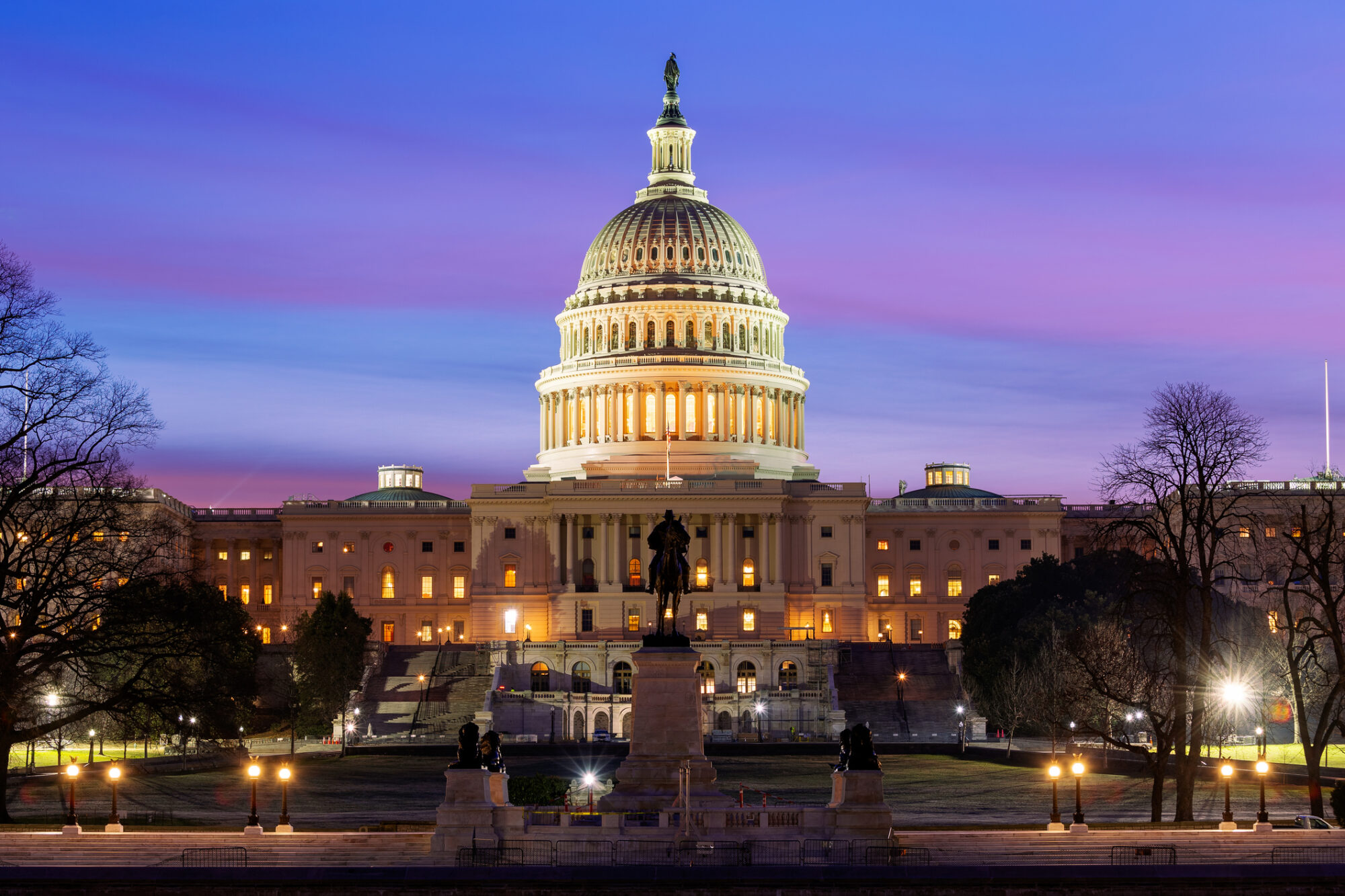
In a bipartisan vote Wednesday, the Senate moved to advance Federal Aviation Administration reauthorization—but lawmakers still face a looming deadline to pass the legislation (The Hill).
What’s going on: “Senators voted 89 to 10 to overcome the first procedural hurdle and move toward consideration of the package ahead of the May 10 deadline.”
- The draft 1,069-page bill—which already has been punted three times—sets the agency’s priorities. It would authorize billions of dollars in appropriations for the FAA, as well as hundreds of millions of dollars for the National Transportation Safety Board, from fiscal year 2024 through 2028.
- But all 100 senators must agree to fast-track the measure for it to pass before next Friday.
Why it’s important: The FAA reauthorization bill renews statutes governing the agency’s civil aviation programs, as well as revenue collection authority. From air traffic operations to airport development, these functions are critical to the U.S. economy and the ability of Americans to travel.
However . . . Both Democrats and Republicans want amendment votes on the measure, and “lawmakers acknowledge it could be a bumpy ride” to passage.
A hot-button issue: One sticky wicket amendment that’s likely to get a vote would remove language in the bill that adds 10 flights at Ronald Reagan Washington National Airport.
- Senators from the Washington, D.C., area say the airport cannot handle any more traffic. Virginia and Maryland are home to Dulles International Airport and Baltimore Washington International Airport, respectively.
